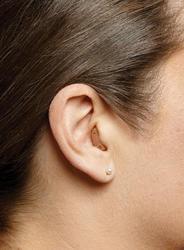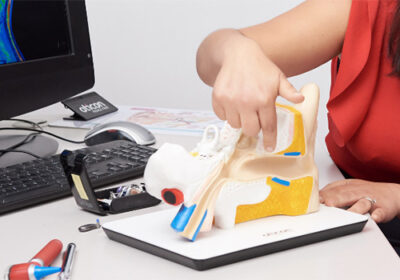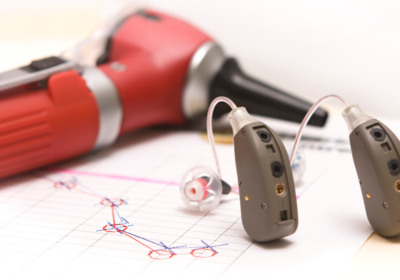Are you aware that hearing loss is more common than it is thought to be?
Figures indicate that one in every six Australian suffers from some form of hearing loss and this number is projected to increase by 2050. However, awareness and addressing the problem on time can help you take appropriate action and deal with the problem effectively. Read on to understand what exactly is hearing loss and when you should seek advice.
 Hearing impairment refers to the inability of an individual to hear and can be temporary, permanent, partial or complete. A common concern, hearing loss can affect people of all ages and impacts the quality of life. Impaired hearing leads to incomplete communication and can restrict the social life of a person. The fact that hearing loss can profoundly affect a person’s social, psychological and emotional well-being, indicates the need for intervention.
Hearing impairment refers to the inability of an individual to hear and can be temporary, permanent, partial or complete. A common concern, hearing loss can affect people of all ages and impacts the quality of life. Impaired hearing leads to incomplete communication and can restrict the social life of a person. The fact that hearing loss can profoundly affect a person’s social, psychological and emotional well-being, indicates the need for intervention.
With modern hearing aids, it is possible to amplify sounds and enhance the ability of an individual to hear and communicate. However, since hearing loss is gradual and is not associated with any symptoms, most people may not even realise their inability to hear sounds clearly. In case you notice a gradual deterioration in your ability to hear, seek advice from your doctor who will conduct a hearing test to determine the type and degree of the problem.
Types of Hearing Loss:
Hearing loss usually develops over time but may also occur suddenly. The two most common types of hearing loss are:
Conductive Hearing Loss:
This type of hearing loss is caused by a damage or obstruction to the outer or middle ear. The obstruction prevents sound from being conducted to the inner ear. This form of hearing impairment is either temporary or permanent depending on the cause. The degree of hearing loss also varies and is usually mild or moderate. The hearing loss may result from an object being trapped in the ear canal, a problem that may prevent the bones in the middle ear from vibrating or a hole in the eardrum.
Sensorineural Hearing Loss:
This is the most common type of hearing loss and is caused by a damage to the auditory nerve or the hair-like cells in the inner ear. This weakens the transfer of sound waves to the sensory hair cells in the inner ear. This type of hearing loss has a plugging effect while implies that while sounds from the outer environment are difficult to hear, the individual’s own voice or chewing are heard clearly. Such a form of hearing loss may result from exposure to loud noise, diseases like meningitis, ear infections, a foreign object being trapped in the ear canal or due to ageing.
Warning Signs of a Hearing Loss:
- The inability to understand and follow conversations
- Difficulty hearing when noisy situations or when in groups
- Harder to understand people unless they face you
- Speech of other people appears mumbled
- You often ask people to repeat
- Watching television and listening to music loudly
- Finding it hard and stressful to follow what other people are saying
- Degrees of Hearing Loss:
 When an individual is professionally diagnosed with hearing loss, they are informed about its severity. It may range from mild to profound and based on the degree of hearing loss, you will be suggested the best solution to address your concern.
When an individual is professionally diagnosed with hearing loss, they are informed about its severity. It may range from mild to profound and based on the degree of hearing loss, you will be suggested the best solution to address your concern.
The degree of hearing impairment is determined by the amount of hearing loss that an individual is experiencing. Hearing capacity is determined by the pitch of sounds known as frequency. Frequency is measured in Hertz. The loudness or intensity of a sound is measured in decibels and ranges from 0 to 140. The level of hearing loss is ranked as:
- Mild:
The most common and under-diagnosed degree of hearing loss, people experiencing it may find it difficult to follow conversations that are soft but are clearly able to hear voices in quiet situations. Individuals with this form of hearing loss find it harder to make our conversations only in certain situations where the background noise is high.
- Moderate:
This form of hearing loss causes people to strain to keep up with and understand conversations irrespective of the setting. In situations where the background noise is low and the ability towards speech discrimination is good, a hearing device can be of help.
- Severe
In this case, a normal conversation is inaudible but a hearing device can help to detect sound. The clarity of a conversation is significantly low and people rely on visual cues to understand a conversation.
Measurement of Hearing Loss:
The device used to measure hearing is known as an audiometer. The test involves presenting a series of both speech and tone sounds to the individual through a headphone. The ears are tested separately and the sound intensity is varied to different pitch frequencies. This is referred to as pure tone audiometry.
The screening is illustrated in a graph known as the audiogram. It represents how loud a sound needs to be for the patient to clearly hear it. Young adults have the ability to hear sounds with a frequency as low as 20Hz. However, the test is only for a range of 250 Hz to 8000 Hz, since most of the speech sound falls in this range.
Addressing a hearing problem on time can make a huge difference to the quality of everyday life. If you are dealing with a hearing concern, it is best to get in touch with a hearing professional. They will investigate the cause and suggest the best treatment options based on your needs. Suitable for all ages, hearing aids are one of the best options that you can explore. By amplifying sounds, hearing aids can enable you to regain your confidence and actively take part in conversations. Available in a range of shapes and sizes, you can work with your audiologist to find a suitable hearing aid.
If you are still unsure and need assistance in selecting the right hearing aid, the qualified hearing professionals at Active Audiology are here to help you. As an independent clinic, we believe if offering unbiased solutions tailored to suit the individual needs of our clients. We have the widest range of options available and can suggest hearing aids that best address your hearing concern, suit your lifestyle and are specifically programmed to your needs. If you wish to know more about our hearing aids, feel free to reach out to our team. You can call us on 1300 364 007. We will be happy to assist you.



